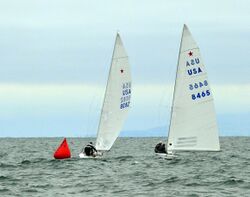Engineering:Star (keelboat)
 Class symbol | |
 | |
| Development | |
|---|---|
| Designer | Francis Sweisguth |
| Year | 1910 |
| Boat | |
| Crew | 2 (Skipper + Crew) S + 1.5 C ≤ 250 kg (550 lb)[1] |
| Draft | 1.016 m (3 ft 4 in) |
| Hull | |
| Type | keelboat |
| Hull weight | ≥ 671 kg (1,479 lb) (including keel)[2] |
| LOA | 6.922 m (22 ft 9 in)[2] |
| LWL | 4.724 m (15 ft 6 in) |
| Beam | 1.734 m (5 ft 8 in) at deck 1.372 m (4 ft 6 in) at chine |
| Hull appendages | |
| Keel/board type | bulb keel 401.5 ± 7 kg (885 ± 15 lb)[2] |
| Rig | |
| Rig type | sloop |
| Mast length | 9.652 m (31 ft 8 in) |
| Sails | |
| Mainsail area | 20.5 m2 (221 sq ft) |
| Jib/genoa area | 6.0 m2 (65 sq ft) |
| Upwind sail area | ≤ 26.5 m2 (285 sq ft) |
| Former Olympic class | |
The Star is a 6.9 metres (23 ft) one-design racing keelboat for two people designed by Francis Sweisguth in 1910. The Star was an Olympic keelboat class from 1932 through to 2012, the last year keelboats appeared at the Summer Olympics.
It is sloop-rigged, with a mainsail larger in proportional size than any other boat of its length. Unlike most modern racing boats, it does not use a spinnaker when sailing downwind. Instead, when running downwind a whisker pole is used to hold the jib out to windward for correct wind flow. Early Stars were built from wood, but modern boats are generally made of fiberglass. The boat must weigh at least 671 kg (1,479 lb) with a maximum total sail area of 26.5 m2 (285 sq ft).[3][2][1] The Star class pioneered an unusual circular boom vang track, which allows the vang to effectively hold the boom down even when the boom is turned far outboard on a downwind run. Another notable aspect of Star sailing is the extreme hiking position adopted by the crew and at times the helmsman, who normally use a harness to help hang low off the windward side of the boat with only their lower legs inside.
History
The Star was designed in 1910 by Francis Sweisguth, a draftsman at the William Gardner Marine Architect office. Over the course of his career Sweisguth designed a variety of yachts. A more traditional example of his work is Silent Maid, a Barnegat Bay B-class catboat designed shortly after the Star. The first 22 stars were built in Port Washington, New York by Ike Smith during the winter of 1910–11. Since that time, over 8,400 boats have been built, with more than 2,000 actively racing in 170 fleets.[4]
The hull is a hard chine design with a slight curve to the bottom section, and a bulb keel. The Star was originally rigged with a large, low-aspect-ratio gunter mainsail and jib, which was replaced by a short bermuda rig gradually during the early 1920s, before the current tall bermuda sail plan was adopted in 1930. In 1965, fiberglass replaced wood as the primary hull material. Other changes to the strict design rules for the Star class, include adding flexible spars, an innovative circular-track boom vang, and self-bailers.[4]
Events
Olympics
The Star was added to the Olympic roster for the 1932 Summer Olympics in Los Angeles. Due to World War II, there were no Olympic games held in 1940 or 1944, and for 1976, the Star was replaced by the Tempest for keelboat competition. In 2011 keelboats were removed from sailing at the 2016 Summer Olympics in Rio de Janeiro. The last keelboat Olympics competition was at the 2012 London Summer Olympics.[5]
World Championships
The Star World Championships has been held annually since 1923. Most titles has American sailor Lowell North won, with five titles between 1945 and 1973 and another seven podiums. The most crowned skipper-crew combination is Italian duo Agostino Straulino and Nicolò Rode and Brazilian duo Robert Scheidt and Bruno Prada with three titles each. Also, American Mark Reynolds has three titles, but with different crew.
Star Sailors League
The Star Sailors League was created in 2013 by athletes to establish a sustainable sailing circuit.
Famous Star sailors
- Ralph Craig (Olympic 100 and 200 meter Champion: 1912)
- Duarte Bello (Championship competitor, 1947–1970s. Invented auto-bailers and circular boom-vang track)
- John F. Kennedy (Nantucket Sound Star Class Championship: 1936)[4]
- Agostino Straulino (Olympic Champion: 1952; World Champion: 1952, 1953, 1956; Olympic Silver: 1956)
- Robert Halperin (Olympic Bronze: 1960; Pan American Games Gold: 1963)
- Paul Elvstrøm (World Champion: 1966, 1967)
- Dennis Conner (World Champion: 1971, 1977)
- Buddy Melges (World Champion: 1978, 1979)
- Iain Percy (Olympic Champion: 2008; World Champion: 2010; Olympic Silver: 2012)
- Robert Scheidt (Olympic Silver: 2008; Olympic Bronze: 2012; World Champion: 2008, 2011, 2012; SSL Finals: 2013)
- Fredrik Lööf (World Champion: 2001, 2004; Olympic Champion: 2012)
See also
- Comet (dinghy), a smaller and more easily transported sailboat, based upon the Star design
References
- ↑ 1.0 1.1 "Star Class Association Rules". International Star Class Yacht Racing Association. January 2015. http://www.starclass.org/rules_items/2015rulespart1and2.pdf.
- ↑ 2.0 2.1 2.2 2.3 "2015 Specifications". International Star Class Yacht Racing Association. 2015. http://www.starclass.org/rules_items/2015specifications.pdf.
- ↑ "Rules of the ISCYRA". International Star Class Yacht Racing Association. 2015. http://www.starclass.org/rules_items/rules.shtml.
- ↑ 4.0 4.1 4.2 Bird, Vanessa (March 22, 2011). "International Star Class". Classic Boat. Classic Classes (Chelsea Magazines Ltd.). http://www.classicboat.co.uk/articles/class-notes/the-international-star-2/. Retrieved 2015-08-23.
- ↑ "Windsurfing and Kiteboarding Committee Presentation". http://www.sailing.org/35891.php.
External links
- International Star Class Yacht Racing Association (ISCYRA)
- International Star Class at the International Sailing Federation (ISAF)
- International Star Class in "Classic Classes" at Classic Boat magazine
- THe Star 45 Class at the American Model Yachting Association (AMYA)
 |




